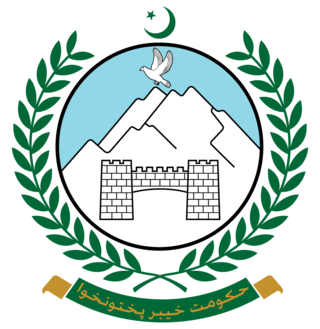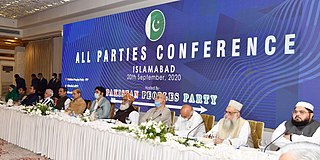
The prime minister of Pakistan is the head of government of the Islamic Republic of Pakistan. Executive authority is vested in the prime minister and his chosen cabinet, despite the president of Pakistan serving as the nominal head of executive. The prime minister is often the leader of the party or the coalition with a majority in the lower house of the Parliament of Pakistan, the National Assembly where he serves as Leader of the House. Prime minister holds office by virtue of their ability to command the confidence of the National Assembly. The prime minister is designated as the "chief executive of the Islamic Republic".

The Government of Khyber Pakhtunkhwa, is the provincial government of the Pakistani province of Khyber Pakhtunkhwa. Its powers and structure are set out in the provisions of the 1973 Constitution, in which 32 districts come under its authority and jurisdiction. The government includes the cabinet, selected from members the Khyber Pakhtunkhwa Assembly, and the non-political civil staff within each department. The province is governed by a unicameral legislature with the head of government known as the Chief Minister. The Chief Minister, invariably the leader of a political party represented in the Assembly, selects members of the Cabinet. The Chief Minister and Cabinet are thus responsible the functioning of government and are entitled to remain in office so long as it maintains the confidence of the elected Assembly. The head of the province is known as the Governor, appointed by the federal government, on behalf of the President, while the administrative boss of the province is Chief Secretary Khyber Pakhtunkhwa.

Yusuf Raza Gilani is a Pakistani politician who served as the 16th Prime Minister of Pakistan from 2008 to 2012. He is currently the Chairman of the Senate of Pakistan since 9 April 2024. Gilani was re-elected on 14 March 2024 after receiving 204 votes and currently is a Senator of the Senate of Pakistan.
Principal secretary is a post in state governments and the central government of India. The position holder is generally a senior Indian Administrative Service officer or other senior civil servants. Principal secretaries generally are the administrative heads of departments in a state government. They can also be deputed to central government in the post of a Joint secretary to Government of India.
Central Jail Rawalpindi is a prison located in Rawalpindi, Pakistan.

The Prime Minister's Office (PMO) consists of the immediate staff of the Prime Minister of India, as well as multiple levels of support staff reporting to the Prime Minister. The PMO is headed by the Principal Secretary to the Prime Minister of India, currently Pramod Kumar Mishra. The PMO was originally called the Prime Minister's Secretariat until 1977, when it was renamed during the Morarji Desai ministry.

The Prime Minister's Office is the principal workplace of the Prime Minister of Pakistan and is headed by the Principal Secretary to the Prime Minister of Pakistan.
Makhdoomzada Syed Asad Murtaza Gilani was a Pakistani politician and parliamentarian. He was elected as a member of the National Assembly of Pakistan on a ticket of the Pakistan Peoples Party from Multan Constituency NA-152 in the 2002 Pakistani general election. Gilani was the nephew of former Prime Minister Yousuf Raza Gilani. He died in the 2015 Mina disaster which killed at least 2,262 people.

The federal secretary is the highest-ranking position in the Government of Pakistan, occupied by the most senior civil servant in a specific ministry or division. The secretary is the administrative head of that ministry or division and oversees and enforces public policy matters. The authority for the creation of this post solely rests with the Cabinet of Pakistan. The position holder is a BPS-22 grade officer, usually belonging to the Pakistan Administrative Service.

Fawad Hasan Fawad is a Pakistani public policy practitioner, former civil servant who served in BPS-22 grade as the Principal Secretary to two Prime Ministers, Nawaz Sharif and Shahid Khaqan Abbasi; and later as caretaker Federal Minister for Privatisation and Federal Minister for Inter Provincial Coordination.

The Establishment Secretary of Pakistan is the Federal Secretary for the Establishment Division and is in charge of the transfers, postings as well as promotions in the country's civil service. The position holder is a BPS-22 Officer, usually belonging to the Pakistan Administrative Service. The Establishment Secretary reports directly to the Prime Minister of Pakistan. The current Establishment Secretary is Inamullah Dharejo.

Grade-22 is the highest attainable rank for a Civil Servant in Pakistan. Grade 22 is equal to a 4-star rank of the Pakistan Armed Forces. With over five hundred thousand civil servants and bureaucrats in Pakistan, only a few dozen officers serve in BPS-22 grade at a given time. Hence, not even 1% of the country's civil servants and/or bureaucrats make it to the highest rank. Officers serving in BPS-22 grade are largely considered to be the most influential individuals in the country.

The Principal Secretary to the Prime Minister of India is the administrative head of the Prime Minister's Office. The officeholder is generally a civil servant, commonly from the Indian Administrative Service and occasionally from the Indian Foreign Service.

Prime Minister House is a palace located in Islamabad, Pakistan. It is the official residence of Prime Minister of Pakistan.

The Pakistan Democratic Movement was a coalition of political parties in Pakistan. It was founded in September 2020 as a opposition movement against Imran Khan, accusing his administration of poor governance, political victimization of opponents, and mismanaging the economy and foreign policy. Khan rebuked these allegations, during and after his tenure as Prime Minister
Muhammad Azam Khan is a Grade 22 officer of the Pakistan Administrative Service. He has previously served as Principal Secretary to the Prime Minister of Pakistan in Imran Khan's government. Prior to his stint in the federal government, he served as Chief Secretary Khyber Pakhtunkhwa. He was nominated as the Executive Director World Bank in February, 2022, however his notification was cancelled by the PML-N federal government in August,2022.

The Interim Constitution of Azad Jammu and Kashmir provides for an apparently transitory autonomous parliamentary framework of self-governance and power sharing for the region of Azad Jammu and Kashmir, defined by the act as the "territories of the State of Jammu and Kashmir which have been liberated by the people of that State and for the time being under the administration of Government and such other territories as may hereafter come under its administration", however, it does not pertain to areas such as Gilgit, Hunza and Baltistan. The act succeeded and re-enacted the Azad Jammu and Kashmir Government Act, 1970 with modifications. It was promulgated under the Prime Minister of Pakistan Zulfiqar Ali Bhutto. The constitution has been amended 14 times till date. It is based on the 1973 Constitution of Pakistan.
In April 2022, a no-confidence motion against Imran Khan led to his removal as the prime minister of Pakistan. Based largely on the Westminster system of legislature, the prime minister commands confidence of the majority of the lower house of Parliament, the National Assembly of Pakistan, under clause (2A) of Article 91 of the Constitution. Numerous opposition parties joined forces to file the motion of no confidence against Imran Khan in the National Assembly. It ultimately led to the removal of Khan from office as a majority passed the motion in the Lower House.
Lettergate was an American-Pakistani political affair set off by a conversation at a farewell lunch for Asad Majeed Khan, then-Pakistani ambassador to the United States, on 7 March 2022 at Khan's official residence known as the Pakistan House. A diplomatic telegram was sent by Ambassador Khan to the Ministry of Foreign Affairs based on the notes taken by a note-taker from the embassy of Pakistan based in Washington, D.C. The telegram allegedly stated that in the course of the meeting, the United States had expressed a desire to the government of Pakistan for prime minister Imran Khan to be removed from office because of his neutral stance on the war between Russia and Ukraine and refusal to back the Ukrainians, promising warmer relations if Pakistan agrees while threatening isolation if it does not. The lunch was attended by US officials including then US Assistant Secretary of State for South and Central Asian Affairs Donald Lu and Deputy Assistant Secretary Lesslie Viguerie. The Pakistani diplomats attending the lunch meeting included Deputy Chief of Mission Syed Naveed Bokhari and the defence attaché.
Asad Rehman Gilani is an officer of the Pakistan Administrative Service (PAS) currently serving as Principal Secretary to the Prime Minister of Pakistan. Gilani belongs to the 24th Common Training Program and is among the very few federal secretaries alongside Sardar Ahmad Nawaz Sukhera and Rizwan Ahmed who are Harvard graduates.












